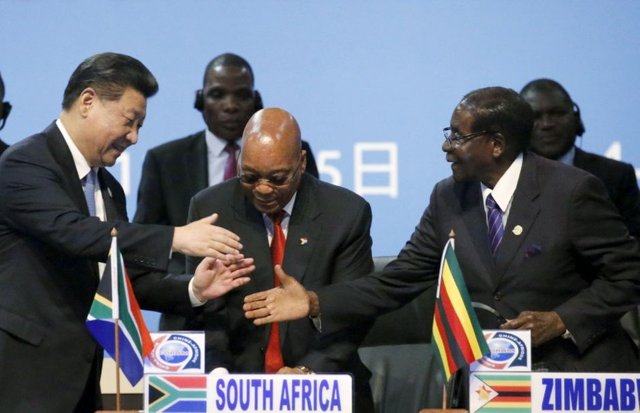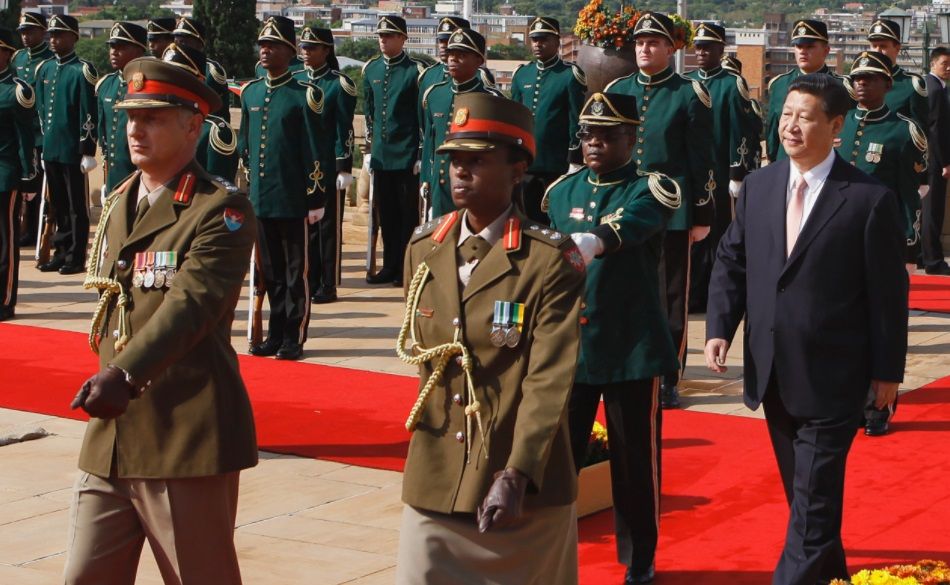This is how China, slowly but surely, is gobbling up Africa.
It is no accident that China has opened its first naval base on the African continent. The fact is part of a much broader strategy, with which Beijing seeks to extend its influence on the rest of the world.

Why is China so interested in Djibouti? Why have they invested $ 15 billion in one of Africa's smallest and poorest countries? And why did they decided to build this first naval base overseas? According to the representative of the Chinese Foreign Ministry Geng Sghuang, with these facilities his country seeks to better fulfill its international obligations to accompany missions and humanitarian assistance, and also to contribute to promote the economic and social development of Djibouti.

However, the Global Times, known as the unofficial spokesman of the Chinese Communist Party, was more direct and in one of the editorials that addressed the issue faced fears that the opening of that base in the Red Sea would not be about controlling the world. The truth is that while the government of the United States breaks with its allies and Europe is going through a difficult time, China has undertaken a silent, but effective campaign of geopolitical expansion. And in that process, Africa has not only been its training ground, but also its greatest success and its springboard to other regions.
Since 2009, China has been the main trading partner of this continent and is now the destination of 16 percent of its exports and the origin of a fifth of its imports. In addition, Beijing is on track to become the region's largest source of foreign direct investment (FDI) and is already the largest funder of infrastructure projects. Within the same process, the Asian giant has created several areas of economic and trade cooperation, and has also funded several development aid funds.
The results are seen all over the continent. Over the last decade, China has financed the construction of hydroelectric power plants, dams, airports, aqueducts, hospitals, railways, stadiums, gas pipelines, hotels, refineries, gas and coal plants, official buildings, highways and power grids in 52 of the 54 countries in Africa. Although the effect has been most notable in the smaller and poorer countries of the region (such as Djibouti), the fact is that China has concentrated most of the resources in the largest and richest countries in the region, such as Nigeria, Algeria, Angola, South Africa and Kenya. At the same time, it has allocated a large part to the oil and mining sectors, which has resulted in large investments in Angola, Congo, Sudan, Zambia, South Africa and Nigeria. And last year, Namibia, where state-owned General Nuclear built a uranium mine to feed the 37 nuclear reactors already operating in the Asian giant (there are another 20 under construction).

The emphasis in these countries is that since its inception the Chinese presence in Africa had two goals, not always successful. On the one hand get oil, coal, gas, uranium and other materials to fuel an economy that last decade grew at an average of 10 percent of GDP. And on the other, conquer allies in a unipolar world dominated economically, politically and geographically by the United States.
On balance, less than two decades into the policy, the outcome is very encouraging for Beijing. According to the latest Afro-Barometer report, 63 percent of Africans have a good or very good image of China. The same survey revealed that more are those who consider that the influence of that country is greater than that of the United States. And, even more strikingly, it is clear that in the center and the south of the continent, its inhabitants consider that the Chinese development model is superior to the North American one. As Jing Gu, director of the Center for Emerging Powers and Global Development at the University of Sussex said China’s 'soft power' is nowhere more apparent than in Africa.
Sino-African relations are not new, for already in the fifteenth century explorer Zheng He came to Mozambique with his huge merchant ships. However, the isolationist policies that dominated the Ming and Qing dynasties led to the fact that only Mao's time began to build real relationships. And that historical absence defined two of the parameters that have marked the Chinese advances in the black continent.
On the one hand, Beijing was able to take advantage of the wounds left by European colonization and cemented the nascent relations under the sign of anti-colonial solidarity between his country and the African nations. That is why the Chinese do not raise the same imperialist fears as the Americans, the French, or the Russians. Chinese and the Africans are brothers, comrades who suffered the same humiliation and the same plunder at the hands of the Empires of old.

On the other hand, since they won the civil war in 1949, the Communist leaders of the People's Republic knew that the 54 countries of Africa were fundamental in the diplomatic battle for international recognition against the claims of legitimacy of the nationalists settled in Taiwan . That support was key in 1971, when the UN voted to expel the Taiwanese from the organization and incorporated in its place the People's Republic. And today, only Burkina Faso and Swaziland maintain their diplomatic relations with Taiwan.
However, China's success in Africa is difficult to understand if two keys to Beijing's foreign policy are not present. First, their ability to supply inputs and other products at prices that the United States and the former colonial powers can hardly match. Second, their willingness to ally themselves with anyone, such as despotic governments such as those of Sudan and Zimbabwe, which the Chinese justify with the principle of respecting the sovereignty of each country. And thirdly, their lack of scruples when it comes to undertaking devastating projects for the environment, arguing that it cannot change local legislation, which in many cases are tailored to their commercial interests.
And beyond the commercial issues, China began to make military presence. In 2008 with anti-piracy missions off the coast of Somalia, and since 2014, when the Islamic State began its expansion on the continent, it participates in anti-terrorist actions. Indeed, in 2015 President Xi Jinping spent 100 million dollars to support the African Union, and today Beijing has 2,500 men in Congo, Liberia, Mali, Sudan, South Sudan, Ivory Coast, Western Sahara and Djibouti, where his men arrived to inaugurate a naval base.

All of the above is of global relevance when it is realized that Africa's control is key to the Silk Road and Silk Road Initiative, which China announced in 2013, and that if it materializes, it will allow Beijing to dominate the Indian Ocean and Asia. And this in turn would enable it to control India's trade initiatives and dominate the flow of trade in virtually all of Eurasia. If we bear in mind the terrible relations that China has with most of its neighbors, the growing tensions surrounding its relations with the United States and its historically tense relations with Russia, it is clear that the black continent is becoming a true Dorado for Asian dragon.
References:
http://www.fmprc.gov.cn/mfa_eng/
http://www.focac.org/eng/zfgx/
http://www.globaltimes.cn/
http://www.afrobarometer.org/
http://www.ids.ac.uk/
Are you into this type of topics, plus others like science, technology, human state, politics? Keep the conversation alive …. UPVOTE & perhaps, RESTEEM, and in addition you might want to click on the FOLLOW for further interesting posts. If visiting, please don’t leave without placing your comment(s).
Very good write up and is a giant wake up call to the world.
My question is one of nuclear demand.....when is the growth of U308 of China and Africa going to surpass Japan as the deciding factor for the demand. China and Africa is growing (actually middle class size is greater than India) and Japan is declining. Does anyone have that information ?
Agree with you. I think China intends to become the next US with it pushing its presence into underdeveloped countries all around the world.
WIth over 1.35B in population it is certainly on its way. The demands for basic products and materials is just unimaginable ... speak mandarin? we better start learning...
No wonder Chinese classes are opening up rapidly in Kathmandu.
Really nice write up. I found this very interesting. I had zero knowledge of this until now. Great work.
Thank very much. I surely appreciate your note. Cheers.
No problem, I used randowhale to upvote your post in the hopes it got more views, as I can see a lot of work has gone into it and I genuinely found it interesting.
humm don't know about this what is the meaning of voting via randowhale ?
The comment below that says "This post received a 3.6% upvote from @randowhale thanks to @somecoolname". You send randowhale 1 STEEM DOLLAR and he upvotes the post. He has a lot of voting power so it puts the value of your post up.
I sent 1 STEEM DOLLAR to him so he would upvote your post as I thought it was very good and my voting power is worth very little.
If you click the link in comment For more information, click here! it explains it all.
@indepthstory - I like your post. Looking forward to see some more informative posts like this one from you.
yeh that true, China grow with time. if you have friends in #morocco i need something thx @indephstory.
I agree with your writing, though slowly, but chinese will drown affrika